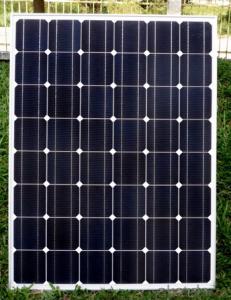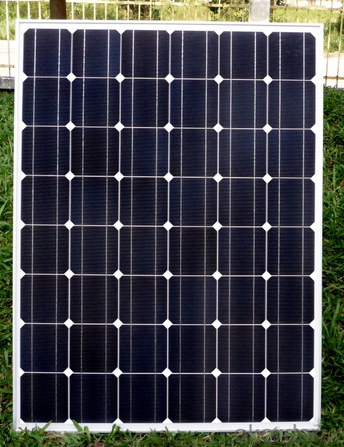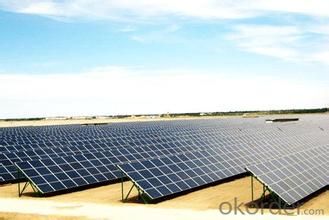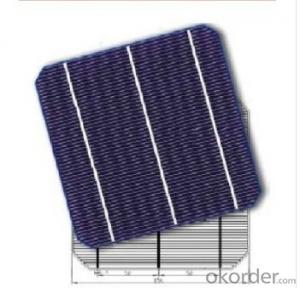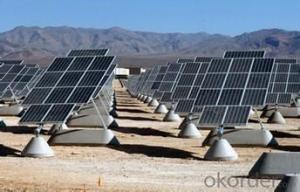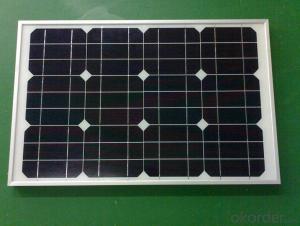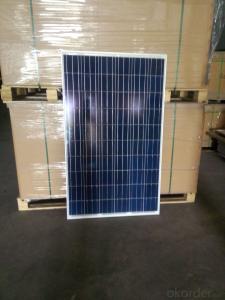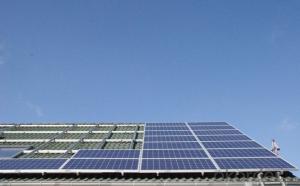25kW Solar Energy Systems for Boats with 25 Years Quality Assurance
- Loading Port:
- Shanghai
- Payment Terms:
- TT OR LC
- Min Order Qty:
- 1 pc
- Supply Capability:
- 100 pc/month
OKorder Service Pledge
OKorder Financial Service
You Might Also Like
Specification
25KW Solar Home Solution with 25 years Qualtiy Assurance
Production description
PV systems range from small, rooftop-mounted orbuilding-integrated systems with capacities from a few to several tens of kilowatts, to large utility-scale power stations of hundreds of megawatts. Nowadays, most PV systems are grid-connected, while off-grid or stand-alone systems only account for a small portion of the market.
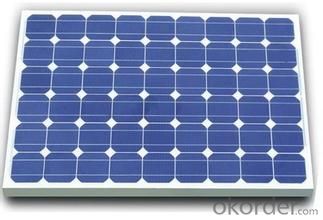
Feature
1.High conversion efficiencies resulting in superior power output performance.
2.Outstanding power output even in low light or high temperature conditions
3.Optimized design for ease of soldering and lamination
4.Long-term stability,reliability and performance
5.Low breakage rate
6.Color uniformaity
Physical characteristic
1. Rigorous quality control meets the highest international standards.
2. High-transmissivity low-iron tempered glass, strong aluminium frame.
3. Using UV-resistant silicon.
4. IS09001/14001/CE/TUV/UL
- Q: Do solar energy systems require a battery for storage?
- No, solar energy systems do not necessarily require a battery for storage. While batteries can be used to store excess energy generated by solar panels for use during times when there is no sunlight, it is not a mandatory component of a solar energy system. Other options for storing excess energy include grid-tied systems, where excess energy can be fed back into the electrical grid, or using net metering arrangements where excess energy is credited and can be used at a later time.
- Q: What is the system voltage of solar panels
- System voltage refers to the number of solar panels composed of a solar power generation system, the maximum DC voltage of the power system.
- Q: Are there any noise or sound issues with solar energy systems?
- Solar energy systems do not produce any noise or sound issues as they operate silently.
- Q: Can solar energy systems be used for powering electric vehicle repair and maintenance facilities?
- Certainly, electric vehicle repair and maintenance facilities can utilize solar energy systems to power their operations. The facility can choose to install solar panels either on their rooftops or in the vicinity, enabling them to capture sunlight and convert it into electrical energy. This renewable energy source can then be used to operate the necessary equipment and tools for repairing and maintaining electric vehicles. By utilizing solar energy, repair and maintenance facilities can significantly decrease their dependence on traditional electricity grids and fossil fuel-based energy sources. This not only aids in reducing operational costs but also plays a role in minimizing the facility's carbon footprint, thus promoting sustainability and environmental responsibility. Furthermore, solar panels are particularly suitable for installation in electric vehicle repair and maintenance facilities due to the availability of large roofs or open spaces. Any surplus electricity generated during daylight hours can be stored in batteries or fed back into the grid, ensuring a continuous and uninterrupted power supply even when faced with cloudy or nighttime conditions. Additionally, solar energy systems can be used to directly charge electric vehicles themselves. By installing electric vehicle charging stations that are connected to the solar panels, the facility can provide customers with the option of renewable energy charging, making it more appealing for electric vehicle owners. In conclusion, employing solar energy systems to power electric vehicle repair and maintenance facilities is a sustainable and economically feasible solution that aligns with the increasing adoption of electric vehicles and the imperative to reduce greenhouse gas emissions.
- Q: How is solar energy stored for later use?
- Various methods exist for storing solar energy for later use. One widely employed approach involves the utilization of solar batteries or energy storage systems. These batteries become charged during daylight hours, when excess solar energy is being generated. Subsequently, the stored energy can be utilized during periods of limited or no sunlight, such as nighttime or cloudy days. An alternative means of storing solar energy is through the adoption of thermal energy storage systems. These systems convert solar energy into thermal energy, which is then stored in a medium like water or molten salt. This stored thermal energy can subsequently be utilized to produce electricity or heat whenever necessary. Moreover, solar energy can be indirectly stored through the utilization of pumped hydroelectric storage. Excess solar energy is employed to pump water from a lower reservoir to a higher one. When electricity is required, the stored water is released and flows down to a lower reservoir, generating electricity via turbines. In addition, solar energy can also be stored in the form of compressed air. Excess solar energy is utilized to compress air into storage containers. When electricity is needed, the compressed air is released and expanded through turbines, generating electricity. In conclusion, the storage of solar energy for future use plays a critical role in ensuring a consistent and uninterrupted power supply. These storage methods enable us to maximize the advantages of solar energy and overcome the challenges posed by its intermittent availability.
- Q: Can a solar energy system be used in cold climates?
- Yes, a solar energy system can be used in cold climates. While it is true that solar panels are most efficient in sunny and warm conditions, they can still generate electricity in cold climates. In fact, solar panels can even perform better in colder temperatures due to their ability to convert sunlight into electricity more efficiently. Additionally, snowfall on solar panels can be beneficial as it acts as a natural cleaner, reflecting more sunlight onto the panels and increasing their efficiency. However, it's essential to consider the angle and position of the panels to ensure they receive optimal sunlight throughout the year. Overall, with proper installation and maintenance, solar energy systems can be effectively utilized in cold climates to generate clean and renewable energy.
- Q: Can a solar energy system be used in areas with high levels of dust or sand?
- Indeed, areas abundant with dust or sand can indeed utilize a solar energy system. Nonetheless, it is imperative to acknowledge that an excess build-up of dust or sand can gradually diminish the system's efficiency. To address this issue, it may be necessary to perform regular maintenance and cleaning of the solar panels. Moreover, the installation of the panels at an inclined angle or the application of anti-reflective coatings can assist in minimizing the detrimental effects of dust or sand on the system's performance. Despite these hurdles, solar energy systems can still thrive in such locations, particularly when appropriate precautions and maintenance measures are implemented.
- Q: Are there any risks of electrical shock with solar energy systems?
- Yes, there are potential risks of electrical shock associated with solar energy systems. While solar energy systems are generally considered safe, the presence of high voltages and electrical currents within these systems can pose a risk if not properly managed or handled. Some of the key risks include: 1. Installation and maintenance: During the installation and maintenance of solar panels, there is a risk of coming into contact with live electrical components. This can occur if proper safety procedures are not followed, or if individuals without proper training attempt to handle electrical connections. 2. Faulty equipment or wiring: Malfunctioning or faulty equipment, such as inverters or wiring, can increase the risk of electrical shock. Poor installation practices or inadequate maintenance can also lead to electrical faults, which may expose individuals to dangerous electrical currents. 3. Fire hazards: Although not directly related to electrical shock, faulty electrical components or wiring can increase the risk of fire in solar energy systems. Fires can further exacerbate the risk of electrical shock if individuals attempt to extinguish them without shutting down the electrical system first. To mitigate these risks, it is crucial to follow proper installation and maintenance procedures, which often include working with a licensed professional. Additionally, individuals working with solar energy systems should be trained on proper safety protocols, such as wearing appropriate personal protective equipment and ensuring electrical systems are properly grounded. It is also important to regularly inspect and maintain solar energy systems to identify and address any potential electrical hazards.
- Q: Can solar energy systems be installed in urban areas?
- Yes, solar energy systems can be installed in urban areas. In fact, urban areas offer great potential for solar installations due to the availability of rooftops, parking lots, and other spaces where solar panels can be mounted. With advancements in solar technology and innovative installation methods, urban areas can benefit from clean and renewable solar energy to meet their power needs.
- Q: Can solar energy systems be used in commercial or industrial applications?
- Yes, solar energy systems can definitely be used in commercial or industrial applications. In fact, many businesses and industries around the world are increasingly adopting solar energy systems to power their operations. These systems can be installed on rooftops, parking lots, or ground-mounted, providing a reliable and sustainable source of electricity. Not only does solar energy help businesses reduce their carbon footprint and lower their energy costs, but it also provides them with long-term energy independence and resilience.
Send your message to us
25kW Solar Energy Systems for Boats with 25 Years Quality Assurance
- Loading Port:
- Shanghai
- Payment Terms:
- TT OR LC
- Min Order Qty:
- 1 pc
- Supply Capability:
- 100 pc/month
OKorder Service Pledge
OKorder Financial Service
Similar products
Hot products
Hot Searches
Related keywords
